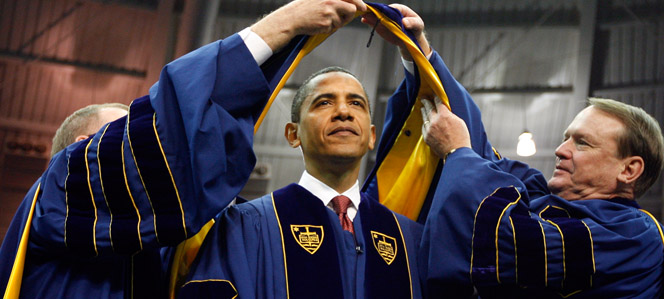
Obama and Notre Dame
By Rev. Robert Barron And that is why I was particularly chagrined to learn that Notre Dame has invited Barack Obama to be its commencement speaker and has resolved to grant him an honorary degree in law. President Obama is, obviously, a man of many virtues and accomplishments, and a decent human being, but he holds to a public position—legal protection for practically unlimited access to abortion—that is directly repugnant to Catholic moral teaching and anthropology. To make matters worse, President Obama’s advocacy of the Freedom of Choice Act makes him the most radically pro-abortion president in our history. The prohibition of the direct killing of the innocent is, on the church’s reading, the undebateable foundation for the ethical enterprise itself, the sine qua non of any coherent moral discourse. Therefore, to dispute this prohibition is far more than to take an incorrect stance on a particular issue; it is to stand athwart the very structure of moral logic itself. To claim that there are circumstances under which an innocent life can be taken—or what is worse, to grant legal protection for such an action—is therefore tantamount to complete moral relativism, and this is why the church feels so strongly about abortion. If innocent life can be attacked, then, in prinicple, anything goes. The critics mistake this for “one issue” politics; it is, in fact, taking a stand against a fundamental ethical indifferentism. And this is why I join a swelling chorus of those who say someone who holds to the pro-choice position as fully and enthusiastically as the president does should not be given a platform at a university that claims a Catholic heritage and identity. One great counter-argument to my position is based upon the notion of academic freedom and runs as follows. At any university worthy of the name, the free exchange of ideas must be tolerated as the condition for the possibility of coming to authentic knowledge. Therefore, even those intellectual positions that one finds unappealing or objectionable must, in the context of the university, be allowed expression in the public forum. Thus, if Notre Dame—or any other Catholic university—aspires to be taken seriously in the secular academic milieu, it cannot allow ecclesiastical orthodoxy to compromise its identity as a seat of higher learning. The first problem with this argument is that it is hypocritical. Anyone even vaguely associated with the secular academy knows that it is governed by a fairly strict ideological orthodoxy and marked by many forms of censorship, both explicit and implicit. If you think I’m exaggerating, try arranging for a speaker on a secular campus who advocates colonialism, apartheid, the subordination of women to men, or the denial of basic rights to gays. Mind you, I’m against these things as well, but I think it’s duplicitous to find one kind of orthodoxy perfectly acceptable and another inherently objectionable. The second and more fundamental problem is that it assumes that, at a Catholic university, the values of the secular academy ought to position those of the church. As Pope John Paul II argued, Catholic institutions of higher learning come out of the heart of the church and exist to serve the church’s mission. Therefore, the values that belong properly to the university—free inquiry, open conversation, the exchange of ideas—should be fostered, but they must be situated within the framework provided by the beliefs and practices of the church. If the church’s teaching does not position the ideals of the university, the ideals of the university will position the church’s teaching. There is no third option. My fear is that, by honoring Barack Obama, Notre Dame demonstrates that it is a university first and Catholic second. And if that is the case, Notre Dame will go the route of myriad other formerly religiously affiliated universities which are now irretrievably secular: Harvard, Yale, Princeton, Northwestern, Duke, the University of Chicago, to name just a handful of the most prominent. And that would be a terrible loss to the church. |

Obama and Notre Dame
Share